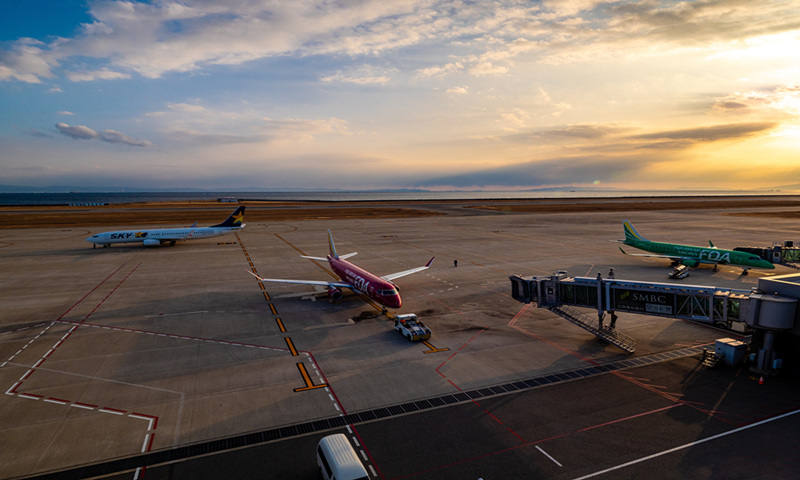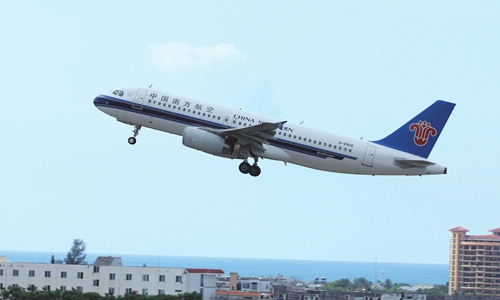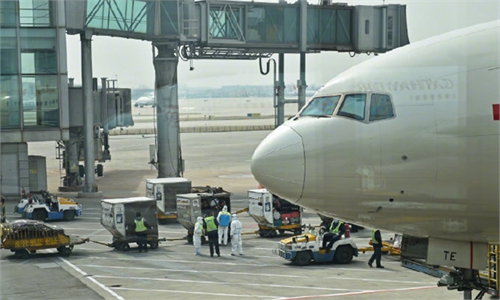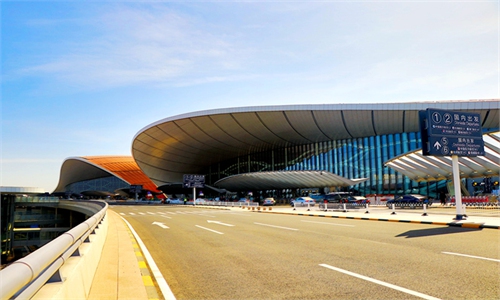
Aircrafts on the tarmac at an airport Photo: VCG
China's Foreign Ministry on Wednesday slammed claims of non-market practice in China's aviation industry in a US statement following a truce between the US and the EU over a long-running dispute between Airbus and Boeing, saying such accusations are groundless.The US and the EU's apparent attempt to target China's development could also hurt the global aviation industry as a whole in the long term, as China is a huge market for global suppliers, Chinese observers noted.
The US and the EU on Tuesday agreed on a five-year truce to end their trade dispute over aircraft subsidies for Boeing and Airbus that has lasted for 17 years.
"Significantly, we also agreed to work together to challenge and counter China's non-market practices in this sector that give China's companies an unfair advantage," US President Joe Biden said in a statement late on Tuesday.
Although the long-running aircraft subsidy dispute has little to do with China, such a statement is widely believed to target Commercial Aircraft Corp of China, the producer of the Chinese home-made C919, an emerging rival for Airbus and Boeing.
"China will not accept the groundless accusations of non-market practices," Zhao Lijian, spokesperson for China's Foreign Ministry, said in response to the US' statement on Wednesday, urging the EU and US to focus on their own development and not point fingers at China.
The development of the US-EU relationship is their internal business, but they should not make random accusations against China, Zhao said, adding that to play up the so-called China challenge and target China is narrow-minded, and not the way of thinking that big powers such as the US and EU should have.
The aviation sector has never been a purely commercial sector in the US or the EU, and both Airbus and Boeing have used "non-market practices" in the past, Lin Zhijie, an independent analyst, told the Global Times on Wednesday.
"The WTO has determined that both the US and the EU have had subsidies for locally produced aircraft. Some of the companies' deals, such as Boeing's attempt to acquire Embraer SA and Airbus' deal with Bombardier, can also be seen as non-market practices," Lin said.
Chinese observers said the aviation industry is happy to see the truce, for it can also bring down air ticket prices, which could help the bleeding travel industry amid the amid COVID-19 epidemic.
But the truce will have a limited impact on China's C919, as it is still a late arrival among global peers and it is at the first stage, and it will still take time for the C919 to win global market approval, Qi Qi, a market watcher, told the Global Times on Wednesday.
He warned that such "non-market practice" claims will only hurt global aviation industry suppliers' interests, including those from the US. China's aircraft industry is still lagging behind, and it still needs global suppliers' help in terms of high-end equipment, components and system solutions.
The fact is that the Chinese aviation market is a very important market for the US, and the CEO of US planemaker Boeing has said on different occasions that Boeing is eager to win back the Chinese market as soon as possible.
The latest comment came on June 4, when Boeing Chief Executive Officer Dave Calhoun once again showed his concern about China-US trade relations, saying he could not predict when a "thaw " would open up jet deliveries in one of the world's fastest-growing aviation markets, according to Reuters.
The US is also engaging with China in the hope that the Chinese aviation regulator might grant approval for the Boeing 737 MAX planes to resume service. The planes were grounded more than two years ago after two fatal crashes.
In a Bloomberg interview, US Commerce Secretary Gina Raimondo said on Tuesday that the US has been working on the resumption of flights.
"China's a big market, and we have to make sure that American companies can do business there and export there," Raimondo said.
Asked about the engagement, Zhao said that the design changes need to be certified, pilots need to receive proper training and effective improvements need to be made to address the specific findings of investigations into the crashes.
Flights using the Boeing 737 MAX in China are in the process of resuming, but the resumption will be slow, requiring approval of China's aviation regulators and even additional test flights, Wang Ya'nan, chief editor of Aerospace Knowledge magazine, told the Global Times on Wednesday.
Wang said that the truce between Boeing and Airbus will inevitably squeeze some of the price advantage of Chinese planes, which offer international quality standards but are priced below Boeing and Airbus.
"Lifting tariffs will undoubtedly make Boeing and Airbus products cheaper in the US and European markets, and for Chinese planes that are late arrivers, the competition will be even more intense," Wang said.



